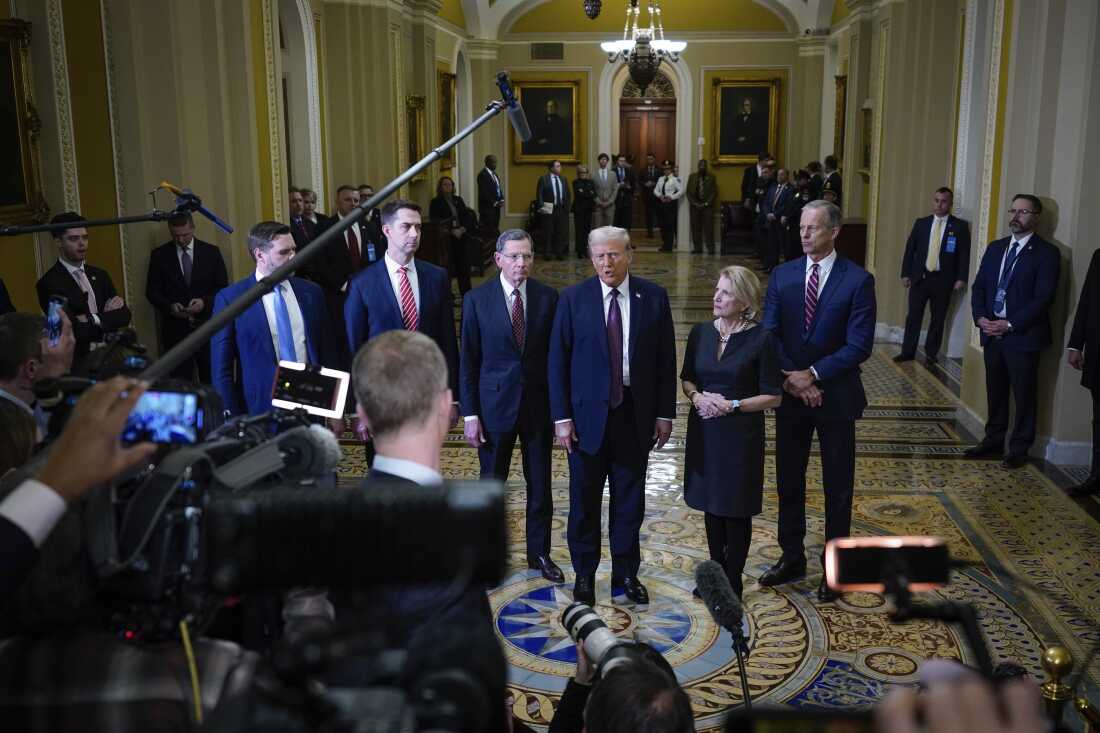
As the deadline for passing President Donald Trump’s ambitious tax reform bill looms, Congressional Republicans find themselves caught in a political quagmire, struggling to reach consensus on critical issues that threaten to derail their efforts.
The pressure is mounting as the GOP attempts to deliver on one of Trump’s key legislative priorities. However, with just a few weeks remaining before their self-imposed Memorial Day deadline, Republicans are still far from agreeing on several contentious issues, including cuts to Medicaid and the controversial state and local tax (SALT) deduction cap.
The challenges facing the GOP are only growing more complicated as internal divisions become more apparent, leaving many members of the party questioning whether they will be able to deliver on their promises before time runs out.
On the House side, Republican leaders are scrambling to find common ground on the various pieces of the bill. The lack of agreement is particularly evident in discussions surrounding Medicaid, where Republicans are divided on the specifics of proposed cuts.
The House Energy and Commerce Committee, which oversees Medicaid, is scheduled to vote on its portion of the bill, but significant disagreements remain over how deep the cuts should go. The budget resolution that serves as the blueprint for the bill calls for at least \$880 billion in cuts, a goal that many experts believe is impossible to achieve without significantly affecting the safety net program.
Despite this, Republicans are pressing forward, with many pushing for work requirements, six-month registration checks, and restrictions on undocumented immigrants’ access to Medicaid. However, moderates within the party have drawn a firm line against more extreme measures, such as per capita caps, which would place limits on Medicaid expansion enrollees.
Speaker Mike Johnson (R-La.) has repeatedly attempted to reassure his party members, stating that some of the more contentious proposals, such as reducing federal support for Medicaid expansion states, are off the table. Yet, the lack of clarity and the ongoing debate about the specifics of the bill are creating confusion and uncertainty within the GOP ranks.
As the House struggles to reconcile its differences, the Senate Republicans are growing increasingly frustrated with the slow progress on the bill. With the deadline fast approaching, many Senate members are questioning whether their House counterparts will be able to meet it.
For some Republicans, the prolonged negotiations and lack of a finalized package only serve to highlight the difficulties of passing comprehensive legislation in such a polarized environment. In particular, Senate Republicans are wary of the potential political fallout from a failed attempt to pass a major piece of legislation, especially given the tight margin in the GOP-controlled House.

Senator Markwayne Mullin (R-Okla.), a close ally of Senate Majority Leader John Thune (R-S.D.), expressed concerns about the slow-moving process, noting that progress on one issue often leads to setbacks on another. The result is a frustrating and unpredictable process, where every step forward seems to come at the cost of further delays.
The debate over the SALT deduction cap has only added to the pressure, with Republicans divided on how to handle this politically sensitive issue. The SALT deduction, which allows taxpayers to deduct state and local taxes from their federal tax returns, has become a flashpoint in the negotiations.
Some Republicans, particularly those from high-tax states like New York and New Jersey, are pushing for an increase in the SALT cap from \$10,000 to \$30,000, a move that would benefit wealthier taxpayers in their districts. However, this proposal has been met with strong resistance from conservative deficit hawks, who argue that the cost of such an increase would be prohibitive.
Representatives like Elise Stefanik (R-N.Y.) and Mike Lawler (R-N.Y.) have condemned the proposal, calling it “insulting” and warning that it would derail the broader legislative effort.
Meanwhile, hardline conservatives have pushed back against any increase in the SALT cap, demanding that the policy be offset by cuts elsewhere in the budget. The dispute over the SALT deduction has become a key battleground for Republicans, with both moderates and conservatives staking out their positions on what they view as a critical issue.
Amid these divisions, Speaker Johnson is under increasing pressure to deliver a compromise that will satisfy both hardline conservatives and moderates, as well as the White House. Johnson has worked to maintain a delicate balance, trying to unite the party behind a final package that can be passed by both chambers of Congress.
While he has remained optimistic about the progress being made, the reality on the ground suggests that the path forward is anything but clear. Despite Johnson’s reassurances, the growing tensions within the GOP are raising doubts about whether the bill will be ready in time to meet the Memorial Day deadline.
As the clock ticks down, Senate Republicans are watching closely, hoping that their House counterparts can resolve their differences and put the bill on track for passage. However, some are already beginning to question whether the deadline is achievable, given the deep divisions and the complexity of the issues at play.
Senator Thune, who has been closely involved in the negotiations, remains cautiously optimistic, noting that progress is being made and that the GOP is still working toward a final agreement. “There was, I felt like, a pretty good sense that things are coming together now,” Thune said after a recent meeting with Speaker Johnson and key Trump economic officials.
However, Thune also acknowledged the challenges ahead, recognizing that the process is far from simple and that the GOP’s ability to get the bill across the finish line will depend on the party’s ability to resolve its internal differences. “The wheels can come off multiple times in this process,” Thune admitted, underscoring the unpredictability of the legislative process.
Despite these challenges, Thune expressed confidence that Republicans will find a way to bring the bill back on track, pointing to the party’s ability to pull together in the past.

With the deadline fast approaching, Senate Republicans are watching closely to see whether the House can deliver on its promise to pass a comprehensive tax reform bill by Memorial Day. The outcome of this effort will be crucial for the GOP, as it seeks to deliver on one of Trump’s key legislative priorities.
However, the deep divisions within the party and the growing frustrations over the lack of progress are creating an uncertain outlook for the bill’s passage. If the GOP can’t come to an agreement on key issues, it risks missing the Memorial Day deadline and potentially derailing one of its most important legislative objectives.
As the negotiations continue, the question remains: Can Republicans overcome their internal divisions and deliver on Trump’s tax reform agenda, or will the party’s inability to find common ground prevent them from achieving this crucial legislative victory?



